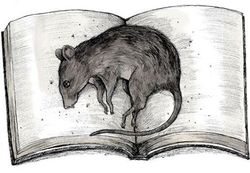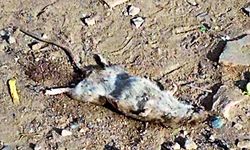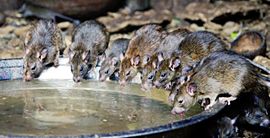Dead Rat

CONGRATULATIONS on your new Dead Rat!
A Dead Rat is a fine choice as a pet. If well cared for, it can provide many years of companionship, all the while making very minimal demands on you, its new owner. If you've had other pets in the past, you'll find that Dead Rats are truly exceptional companion animals. With a very small investment of your time and money, they can become almost entirely self reliant, while still being there for you 100% of the time. Unlike some other pets, which would prefer to spend some nights outside the home hunting for small game, or which may want to spend part of the day sleeping and don't want to be awakened, Dead Rats will never leave you alone, and will never object to being awakened from a nap.
Acquiring your Dead Rat[edit | edit source]
If you haven't yet acquired your Dead Rat, or if you're thinking of bringing home a few more Dead Rats, you should give some thought to what sort of Dead Rat will best suit your needs. There are several ways to obtain Dead Rats, and which one you choose will depend on exactly what sort of rat you want.
Roadkill[edit | edit source]
By far the cheapest and easiest method for obtaining a Dead Rat! Just look for a dead rat lying in the road, and take it home.
There are some drawbacks, however.
- Time required -- Unless you're very lucky, it may be quite a long time before you spot a dead rat in the road. Rats are intelligent animals, and usually avoid being run over. They also aren't very large, so it may be hard to identify them from a distance; consequently, you may find yourself stopping the car and checking out an awful lot of small dead animals before you finally locate your Dead Rat this way.
- Freshness -- Your Dead Rat may have been lying in the road for quite a while before you located it. This can affect the durability of your Dead Rat, and in some cases it may result in a slight but none the less unpleasant odor.
- Non-selectivity -- Your "rat" may turn out, upon careful inspection, to be a dead squirrel, rabbit, cat, or dog. After all the preparations you've made for bringing home your first Dead Rat, this could be a grave disappointment. On the other hand, if you're willing to settle for a dead non-Rat, this can present a quick and inexpensive way of obtaining your new pet, since dead non-Rats are found in the road with substantially greater frequency than Dead Rats.
Lurking in Alleys[edit | edit source]
This is a lot like the "Roadkill" method but you do it on foot. It can save time versus driving around looking for a dead rat lying in the road. That's because most rats don't get hit by cars (they're too smart for that). Instead, they die in back alleys.
Consequently, you may be able to find your Dead Rat by lurking in the backs of alleys in the city, behind the trash cans, waiting for a rat to wander along and die where you can easily catch it.
Drawback: City alleys are not always entirely safe.
Obtain a Dead Rat from a breeder[edit | edit source]
Breeders who are trying for particular sorts of animals tend to produce a lot of "duds" (animals whose hair is the wrong color or ears are the wrong shape, etc, etc). The "duds" are generally culled, which is the word breeders use to avoid saying "killed". With a little luck, you may find a breeder who's willing to give you a "cull", either free or for a minimal charge.
Drawback: Culls are usually very small. Additional drawback: The breeder may think you are strange, and may not want to talk to you.
Obtain a Dead Rat from an animal shelter[edit | edit source]
Make sure it's not a "no-kill" shelter, as their supply of dead animals tends to be far smaller than the "kill" shelters. The largest shelters tend to be "kill" shelters, though, so this doesn't present a significant barrier to obtaining a Dead Rat.
Hints for obtaining a Dead Rat from a shelter with minimal cost and paperwork:
Visit them in person. Dress in as old and ragged an outfit as you can find. Look hungry. They may decide that you're starving, and that you're hoping to eat your Dead Rat. If you're lucky, they may be sufficiently moved by your sad appearance that they give you a whole carton of Dead Rats, for free![1]
Warning: Though you may hint that you need rats for food, you must not actually say it. Only food-grade rats can legally be used as human food. Shelters such as the ASPCA and HSUS do not have food-grade rats, and are legally forbidden to provide them to anyone as food, either for free or for pay. Consequently, if you actually say you're going to eat them, they won't give you any dead rats at all, whether or not you can pay for them.
Entertainment and Toys[edit | edit source]
Unlike some other pets, Dead Rats have an extremely limited need for entertainment, and will not become depressed or (more) lethargic if a day goes by in which you don't play with them. In fact, it's better for their overall health if you don't play with them, as too much play can accelerate hair loss and other problems (see section on health issues, below).
You also won't need to spend anything at all on toys for your Dead Rat, because, when it comes to toys, Dead Rats don't care!
Finding a Good Vet[edit | edit source]
You don't need to! Unlike nearly every other domestic animal, a Dead Rat will never need to be taken to the vet!
Population Control[edit | edit source]
In general, population control is not something you need to worry about with Dead Rats. No matter what size group of them you have, their population will never increase spontaneously. If you wish your group to grow in size, you will have to acquire more Dead Rats.
Spay and Neuter[edit | edit source]
Unlike cats, dogs, rabbits, and other mammals, you don't need to spend anything to spay or neuter your Dead Rat!
Housing for your Dead Rat[edit | edit source]
Perhaps the trickiest question is what sort of 'house' to provide for your Dead Rat.
Unlike other pets, and in particular unlike other small mammals, your Dead Rat will be content to remain in your home with you, and will never attempt to escape. So, you needn't worry about the back door being inadvertently left open or about making sure all the window screens are tight. Consequently, you might think you can just keep your Dead Rat in a box on the kitchen table, or let it hang out in the music room on top of the piano.
Unfortunately, it's not that simple. If you take that course, as they told Jesus when he wanted to visit Lazarus, "there will be a smell". To avoid that unfortunate eventuality, you'll want to provide your new pet with a suitable Dead Rat Habitat.
The primary requirement for your Habitat is good air conditioning. If possible, the temperature should be kept significantly colder than freezing at all times. Don't worry about making your Dead Rat uncomfortable, for this is one of the best points of a Dead Rat: Dead Rats don't care!
Bedding[edit | edit source]
To protect your Dead Rat's fur you should place it in a plastic zip-lock freezer bag when it's in its Habitat. Other than that, it needs no special bedding, because, as we've said before, Dead Rats don't care!
Food[edit | edit source]
You don't need to spend anything on special food for your Dead Rat, because Dead Rats don't eat!
On the other hand, if you find that you've fallen on hard times and you are having difficulties paying for food for yourself, you can eat your Dead Rat. As always, your Dead Rat won't care! You should only do that, however, if you are sure your Dead Rat has been properly maintained at all times. A Dead Rat which has been kept out of its habitat for extended periods and which has consequently acquired a "bad smell" should not be eaten.
Just One, or a Group?[edit | edit source]
So maybe you're about to get your first Dead Rat, or you already have one, and you're thinking of acquiring more. Either way, you need to decide how many Dead Rats you want to keep.
There are two issues to be considered in deciding how many Dead Rats to acquire.
Are Dead Rats Happier in Groups?[edit | edit source]
You may have heard that some animals, including rabbits, mice, and roaches, are social, and will be unhappy if kept alone. You may be concerned that you need to keep several Dead Rats for them to be happy.
We have good news for you -- Dead Rats are just as happy alone as they are in a group. Dead Rats don't care! So, you just should go with whatever number of Dead Rats makes you happiest!
Dead Rats may be more durable if you have several[edit | edit source]
There is one good reason for acquiring several Dead Rats, which is longevity. Your Dead Rat will last indefinitely as long as you keep it in its habitat. However, the more time it spends outside, being played with, sharing an evening on the couch, or being shown off to friends, the more rapidly it is likely to deteriorate. In particular, allowing your Dead Rat to thaw repeatedly will definitely reduce its "shelf life".
But you can easily avoid that problem just by having several Dead Rats! Then you rotate which Dead Rat you have out of its habitat, and never keep any one out too long, and then none of them will ever thaw, and they'll all last much longer!
Illness[edit | edit source]
While they are immune to many common ailments, such as enteritis and bladder infections, Dead Rats none the less are subject to certain ills which you should be aware of.
Hair Loss[edit | edit source]
This is a normal part of the Dead Rat aging process. Just as with human males, as time goes by, their hair tends to become somewhat thinner. A Dead Rat which is removed from its Habitat regularly for play and companionship may experience accelerated hair loss. Excessive grooming of your Dead Rat may also exacerbate the situation.
In general, this condition tends to be progressive, and there's not a great deal that can be done to stop it. It can be slowed by allowing your Dead Rat to spend more time in its Habitat. You might also try applying a light coat of varnish to your Dead Rat. However, while that has been reported to retard hair loss, it can have an effect on the texture of your Dead Rat's coat which some find undesirable.
Rot[edit | edit source]
If is left out of its Habitat for too long, your Dead Rat may be in danger of contracting the disorder known among Dead Rat owners as "rot". The primary symptom is an unpleasant odor whenever the Dead Rat warms up above freezing.
While there is no cure for this disorder, you can halt the progression of the disease if you keep your Dead Rat cold at all times.
Disintegration[edit | edit source]
If "rot" is allowed to proceed too far, it can result in "disintegration". If your Dead Rat contracts this, you may notice pieces of it dropping off when you take it out of its Habitat for a romp. In the worst cases, the integument can separate from the Dead Rat's body, and various internal parts can come loose. When this happens, the bits left behind tend to smell rather vile if not returned immediately to the Dead Rat's Habitat.
While there is no definitive cure for an advanced case of Disintegration, we have heard of some devoted owners who treated mild cases by soaking their Dead Rats in polyethylene resin. Once hardened, the Dead Rat is significantly less at risk. However, even after casting in polyethylene, it's still important to avoid keeping your Dead Rat out of its Habitat for too long, as, if it stays warm for an extended period, the polyethylene casing can burst with considerable violence due to a buildup of gaseous matter in the body of the Dead Rat.
Beetles[edit | edit source]
Beetles are a disorder to which nearly all dead animals are subject, including, ironically enough, dead beetles. Museums must regularly deal with beetle attacks.
In fact, if you keep your Dead Rat in a Habitat such as we've described, you should have no trouble from beetles. They are normally only a problem for owners who freeze dry their Dead Rats. That is an advanced technique which we haven't covered in this Guide. It has advantages and drawbacks compared with just keeping your Dead Rat in a cold Habitat.
The chief advantage is that you don't need to keep a freeze dried Dead Rat cold.
The chief disadvantages are that hair loss may be somewhat more rapid after freeze drying, and, if you don't keep your freeze dried rat at subzero temperatures, it may be attacked by beetles.
If you think this might be for you, you should read our companion Guide, "Freeze Drying your Relatives, Friends, and Pets"
See Also[edit | edit source]
- Jesus as a Pet
- Goats as Pets
- Boys as Pets
- Rocks as Pets
- Humans as Pets
- Disposable Pets
- Pet Heaven
- Pet Shop Boys
- A game about Rocks as Pets
- Peta
- ↑ This technique has been tested repeatedly, and succeeds a large fraction of the time.




